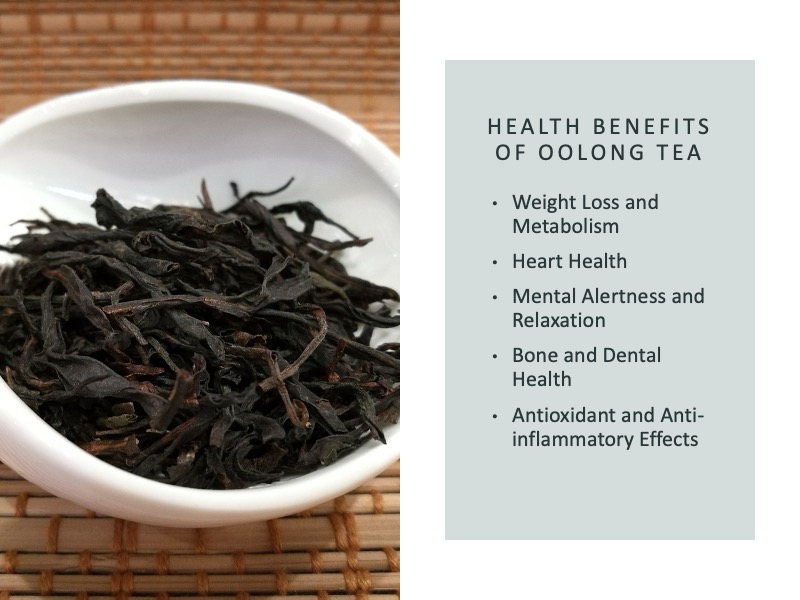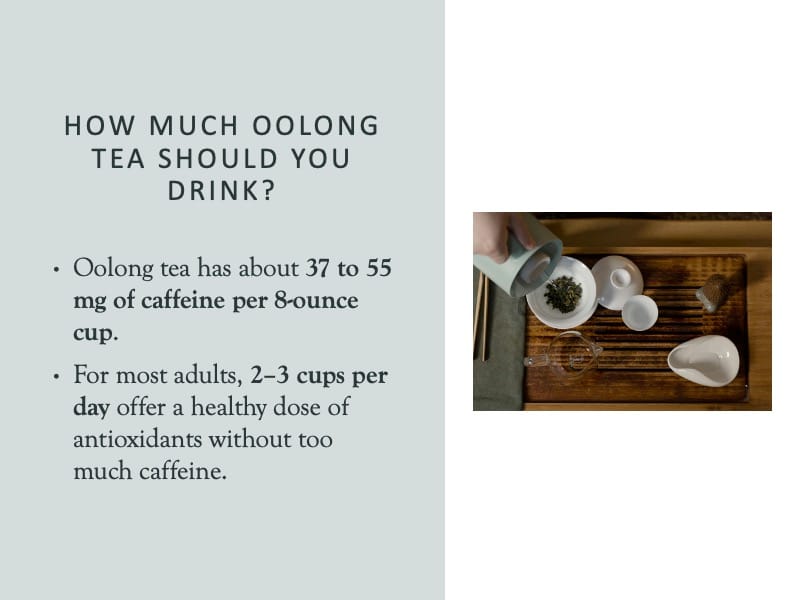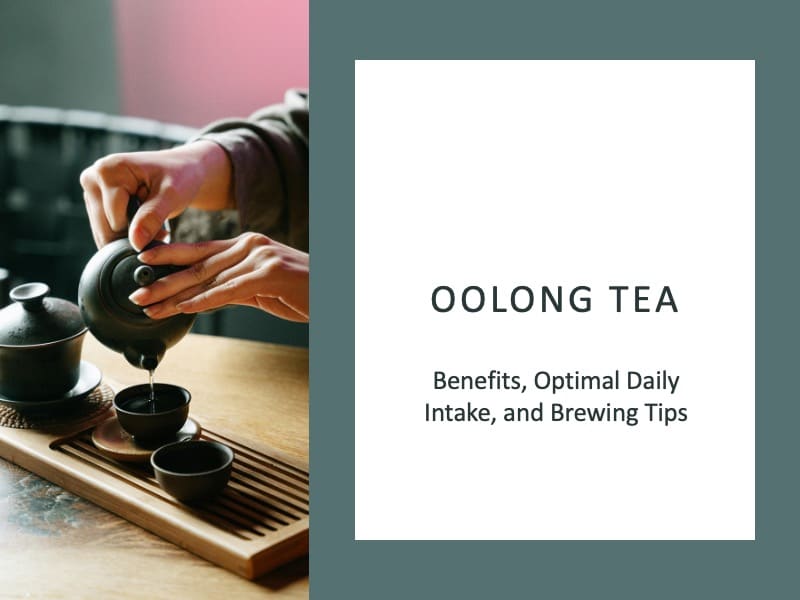Oolong Tea: Benefits, Optimal Daily Intake, and Brewing Tips
Oolong tea is a truly unique brew that brings together the best of green and black teas, offering a complex flavor that can be floral, fruity, or earthy, depending on how it’s crafted.
With roots in China’s centuries-old tea culture, oolong tea is more than just a refreshing drink—it’s packed with antioxidants, polyphenols, and other nutrients that can benefit your health in surprising ways. From boosting metabolism to promoting heart health, oolong tea’s perks go beyond taste.
This guide covers how much you should drink, its remarkable health benefits, potential side effects, and how it compares to other popular teas.
What is Oolong Tea?
Oolong tea undergoes partial oxidation, placing it between green and black teas in terms of flavor and health effects.
Known for its floral, fruity, or earthy flavors depending on the specific variety, oolong tea boasts a rich history and is often linked to health-promoting practices in East Asia.
- Processing and Flavor Profile: Oolong tea leaves are withered, partially oxidized, twisted or rolled, and then dried. This unique processing contributes to its diverse flavor range, from floral and light to robust and smoky.
- Types of Oolong Tea: Varieties include Tieguanyin, Wuyi Rock, and Dong Ding, each with distinct flavor notes and origins.
Health Benefits of Oolong Tea

Oolong tea is a versatile beverage with health benefits ranging from enhanced metabolism to improved mental alertness and heart health.
Consuming 2–3 cups of oolong tea per day can offer a balanced intake of its powerful antioxidants and moderate caffeine levels.
By understanding its effects, brewing techniques, and ideal consumption levels, you can maximize the benefits of oolong tea while enjoying its distinctive flavor profile.
Oolong tea’s complex mix of polyphenols, catechins, and caffeine can provide several health benefits, including:
Weight Loss and Metabolism
Studies suggest that drinking oolong tea for weight loss is a good idea since oolong may aid in fat burning and increase metabolism.
The caffeine and polyphenols work synergistically to increase energy expenditure and fat oxidation, making oolong tea a simple and effective weight loss hack (Hursel et al., 2013).
Heart Health
Regular consumption of oolong tea may help reduce cholesterol levels and lower blood pressure.
The flavonoids in oolong tea support heart health by improving circulation and decreasing inflammation (Sumpio et al., 2008).
Mental Alertness and Relaxation
The caffeine in oolong tea can improve mental focus, while the amino acid L-theanine may promote relaxation without drowsiness, which is why it is one of the best teas to drink in the morning.
This combination is especially beneficial for sustained mental clarity and reduced stress.
Bone and Dental Health
Rich in fluoride and other minerals, oolong tea may help improve bone density and protect against dental issues like cavities.
Antioxidant and Anti-inflammatory Effects
The polyphenols in oolong tea combat oxidative stress, potentially reducing the risk of chronic diseases.
These compounds also help in controlling inflammatory markers, supporting overall health (Wu et al., 2002)
How Much Oolong Tea Should You Drink?

Moderation is key to maximizing oolong tea’s benefits while minimizing potential side effects.
- Recommended Intake
For most adults, 2–3 cups (around 500–750 ml) per day provides ample antioxidants and health benefits without excessive caffeine intake. - Who Should Limit Oolong Tea Intake?
Individuals sensitive to caffeine, those with acid reflux, or those at risk of iron deficiency may benefit from limiting their intake or choosing a different tea variety.
Potential Side Effects of Oolong Tea
While generally safe, oolong tea can cause certain side effects if consumed in large quantities or by individuals with specific health conditions.
- Caffeine Sensitivity
Excessive caffeine can lead to jitteriness, insomnia, or palpitations. People with caffeine sensitivity should consume oolong tea in moderation. - Impact on Iron Absorption
The polyphenols in oolong tea may interfere with iron absorption from plant-based foods. To mitigate this, consider drinking oolong tea between meals rather than during meals. - Possible Interaction with Medications
Some compounds in oolong tea may interact with medications. Consult a healthcare provider if you are on medication for blood pressure, heart conditions, or anxiety.
Caffeine in Oolong Tea
Oolong tea contains an average of 37 to 55 mg of caffeine per 8-ounce cup (about 240 ml). This places it between green tea, which typically has around 20 to 45 mg, and black tea, which can contain 40 to 70 mg per cup (Liang et al., 2003).
The exact caffeine content in oolong tea can vary based on factors like the specific variety, brewing time, and temperature.
- Moderate Caffeine Level: With 37–55 mg per cup, oolong tea offers a moderate caffeine boost that may be enough for mental alertness without excessive stimulation for most people.
- Adjustable Caffeine Content: You can control caffeine intake by adjusting the steeping time. A shorter steeping time extracts less caffeine, while a longer one increases it.
Comparing Oolong Tea vs. Other Teas
Understanding the differences between oolong, green, and black tea can help you choose the right tea based on your health needs.
- Oolong vs. Green Tea
Oolong tea has a higher caffeine content than green tea but provides a different flavor and antioxidant profile. It may be more effective for metabolism, while green tea is often favored for skin and heart health. - Oolong vs. Black Tea
Black tea is fully oxidized, providing a robust flavor and higher caffeine content. Oolong’s partial oxidation makes it a good middle ground for those looking for a moderate caffeine level with varied health benefits.
How to Brew the Perfect Cup of Oolong Tea
Brewing techniques can enhance oolong tea’s flavor and health benefits.
- Water Temperature
Use water at about 185–205°F (85–96°C). Boiling water may produce a bitter taste. - Steeping Time
Steep for 3–5 minutes to release the tea’s flavors without bitterness. Re-steeping oolong leaves is common, with each infusion offering a unique flavor. - Additional Flavoring Options
Honey, lemon, or ginger can enhance oolong tea’s taste. Avoid adding too much sugar, which may counteract some health benefits.
Best Oolong Tea to Buy Online
There’s a world of incredible oolong tea varieties out there, each offering distinct flavors, aromas, and health benefits influenced by the region and method of production. From the floral Tieguanyin to the robust Wuyi Rock oolong, these teas showcase the artistry of tea-making, with each variety providing a unique experience.
Small tea shops are often the best places to explore these specialty oolongs, as they frequently source from artisan producers and offer fresher, more nuanced flavors.
Visiting these shops is a fantastic way to find high-quality teas and support independent tea makers.
However, if you’re looking for an affordable and convenient option to enjoy oolong tea daily, Prince of Peace 100% Organic Oolong Tea offers a practical solution. With 200 tea bags in a single pack, it’s easy to brew a cup whenever you want, whether at home or on the go.
This brand maintains a balance between quality and value, ensuring a satisfying oolong flavor without the cost and complexity of loose-leaf options.
Plus, its organic certification and convenient tea bag format make it an accessible choice for anyone seeking the benefits of oolong tea without the need to hunt down specialty varieties.
Last update on 2025-04-15 / This article includes affiliate links/Images via Amazon Product Advertising API. I may earn commissions on purchases made through these links.
Final Thoughts: Is Oolong Tea Good for You?
Oolong tea is a healthy addition to most diets, offering a balance of antioxidants, moderate caffeine, and unique flavors.
Its potential benefits for metabolism, heart health, and mental alertness make it a versatile choice for daily wellness, and while its caffeine level is moderate, it’s still enough to provide an energy boost without the intensity of coffee.
Additionally, oolong tea is one of the best natural detox drinks due to its metabolism-boosting internal health-promoting properties.
For most people, enjoying 2–3 cups per day can be a great way to support overall health, as long as it’s balanced with a varied diet.
Whether you’re drawn to its flavor, health perks, or both, oolong tea is an enjoyable and beneficial choice worth adding to your routine.
Read Next: Health Benefits of Yerba Mate Tea




